“Listen to everybody, sometimes even a little chicken can show you something.”
Joe’s motto reflects his journey of converting to organic farming. Importantly, it was the opinions, conversations and experiences with his son, who now manages much of the farmland, that caused Joe to come to some realisations about pesticides.
Joe comes from a farming family. One by one his 6 brothers moved on but Joe remained to devote his life’s work to the farmland that was leased to his grandfather in 1981. Livestock and crop production is not something new to Joe, but converting to a fully organic farm is. Joe has dabbled with organic farming since 1999. This year marks a big milestone. By the end of 2022, Joe and his son are hopeful to be the first certified organic animal husbandry farm in Malta. It has been a journey getting to this stage.
As a family business, Joe learnt much from his extended family, his uncle and grandfather in particular who were seen as ‘heros’ from their success in farming. Married in 1991, Joe started to feel unsettled about the chemicals in food products that he would bring home for his wife and young children. Strawberries were a favourite of his childrens, but at the time this fruit was sprayed with chemicals. One of Joe’s sons was very persistent that he wanted to eat strawberries but did not want to be consuming the chemicals sprayed on them. He was concerned about the health impacts that these chemicals have.
As an adult who had grown up around farming, Joe thought he knew everything there was to know. Yet, these conversations with his son made Joe realise that he did not know nearly as much about the impact of these chemicals as he thought he did. This was a lesson from his young son that hit him with the realisation that organic farming must now be a priority. The realisation that you should also:
“Listen to everybody, even sometimes a little chicken can show you something.”
Making the transition to organic farming had its complications. The Malta Organic Agriculture Movement (MOAM) began in 1999, but farmers did not have the extensive internet and media access they do nowadays. With a lack of information about organic farming it was very much a process of trial and error. There were very few printed publications about organic farming available at the time. To access them was a complication in itself. It entailed a journey to the embassy where Joe was given the address to certain publications. He was then directed to the catalogue before having to make a request, receiving it months later. Finding the correct information was not as quick as looking it up on the internet as it is today.
Joe managed to find a couple of books on organic farming but these were for Irish soils, not the Mediterranean. This posed another hurdle as Malta clearly has a very different climate and soil conditions to that of Ireland. Through some of this research and a lot of trial and error, Joe now prefers to use natural organic waste to protect his crop. Stinging nettles are one such plant that works well as a natural pesticide.
Nowadays, Joe’s son is starting to manage more of the farm. Joe’s son originally works as a chef. A career that goes hand in hand with organic farming and this is something that he has utilised. He has hosted nights of cooking on the farm grounds using only local organic vegetables. There has been an excellent response to this with participants more than satisfied with the meat alternatives. Could this be a recurring event to look out for in the future?
He managed to get funding from the Young Farmers Fund to cover costs for restructuring the farm in their process to becoming certified organic. Yet, they receive very minimal funding for being organic. There was help with the initial transition process but now Joe and his son pay 540 euros for the organic certification every year, for each organic produce. That is 540 euros for vegetables, 540 euros for goats, and 540 euros for chickens. Over 1, 500 euros were spent just on certification. The costs have not deterred them though.
Joe will be the first organic dairy farm in Malta. For a relatively small island, this is difficult to achieve. The farm needs organic land for grazing, an indoor area and then a separate area outside that is accessible for the goats 24/7 to use for stretching. On top of that, there must be a bathroom with a toilet and shower, a milking room, a feed room, and Joe is currently building a nursery and isolation area for if the goats become unwell. It’s not a small task to become organic.
The plan moving forward for Joe is to finally have the organic certification this year and to eventually bring in a few cows to make organic cheese. Despite sheep producing more milk, it was a conscious choice to go for goat milk as it is the healthier option. Like a true businessman who understands his products, Joe explained that you have to consider who it is you are targeting. In this case, those who prefer organic produce that is good for your health.
